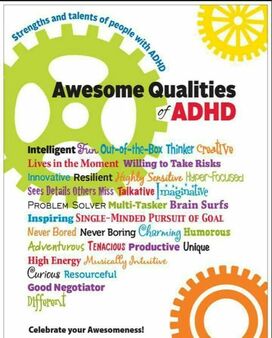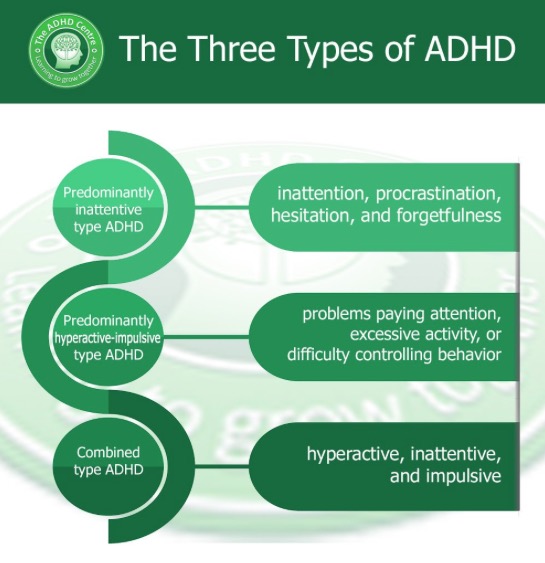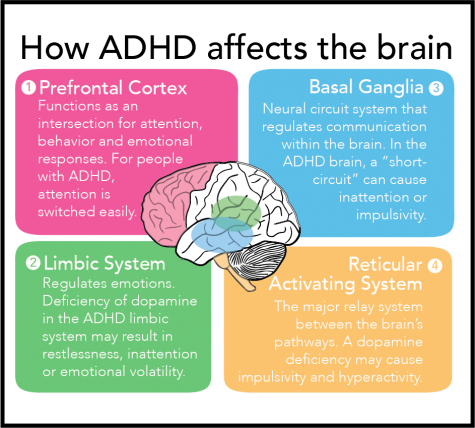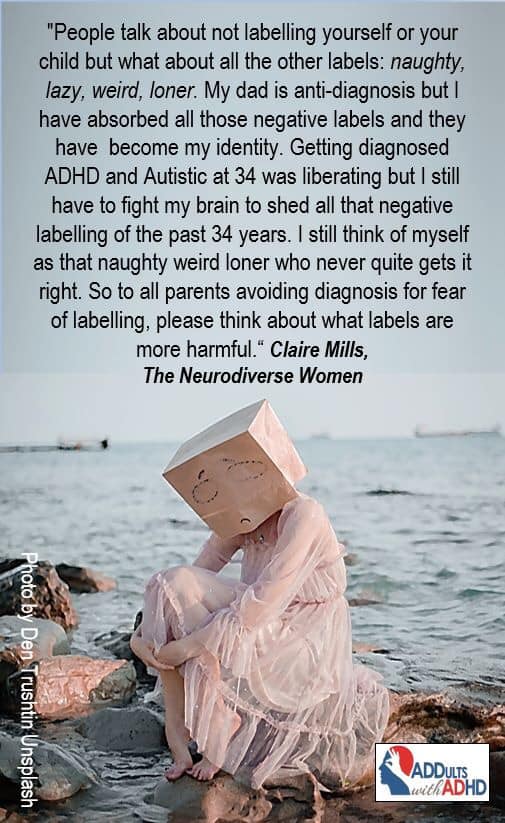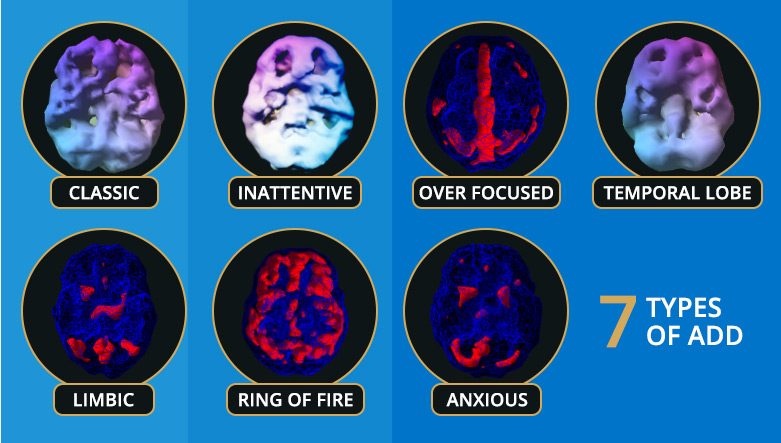Let us first understand more about the medical model.
What Is ADHD?
|
MYTHS
PROCESS OF IDENTIFICATION
|
Often, parents might get fearful of screenings and diagnosis. Do note that assessment results may vary and it does not equate to true cognitive ability. Because many of the learners might have challenges to perform at their optimum or have other co-morbid challenges that might impact on them at that period in time.
Assessments can however be useful to give a basic outline of their developmental milestones and challenges your child might face, this gives more information for educators and professionals to better understand how to support your child. But remember professionals, to try to do strength based assessments as well, it provides a more balanced view and focuses on empowering while supporting the child. Strength-based writing can be found at "Neurology & Learning Page". |
Thousands of kids are being underdiagnosed and undertreated for ADHD |
EARLY SIGNS
ADHD Symptoms Checklist:
|
DIAGNOSIS
|
The Building Blocks of a Good ADHD Diagnosis -A clinical interview. A physical exam. Rating scales and teacher input. Here’s what comprises a good ADHD diagnosis — and what does not. What Every Thorough ADHD Diagnosis Includes - FREE DOWNLOAD Is Preschool Too Early to Diagnose ADHD? [Symptoms Self-Test] Could My Child Have ADHD? Do I Have ADHD? Symptom Test for Adults THINK YOU HAVE ADHD? HOW TO TALK TO YOUR PARENTS? |
Steps to revealing diagnosis
and self advocacy
Understanding the medical (deficit) model in order to understand what is happening beneath.
Please note: The focus is understanding to help educators and parents
learn to understand and not think that it is a pathological behavior.
|
|
|
|
|
|
|
|
|
|
|
The textbook signs of ADD — inattention, hyperactivity, and impulsivity — fail to reflect several of its most powerful characteristics; the ones that shape your perceptions, emotions, and motivation.
Here, Dr. William Dodson explains how to recognize and manage ADHD’s true defining features of rejection sensitivity, emotional hyperarousal, and hyperfocus. |
3 Defining Features
|
|
An org identified 7 types of ADD—and each requires a different treatment plan because of the diverse brain systems involved.
CLICK HERE TO READ ABOUT IT. |
My work for the last decade suggests that we have been missing something important about the fundamental nature of the ADHD brain. ... |
Secrets of Your ADHD Brain |
Your superpower is a natural, ingrained gift. It’s so powerful that you can’t not express it. In some settings, it may help you shine. In others, it may transform into kryptonite. |
CHALLENGES WITH FOCUS
|
STRENGTHS WITH FOCUS
|
HYPERACTIVITY
Understanding Your Child’s Hyperactivity
|
STRATEGIES
|
IMPULSITIVITY
Understanding Your Child’s Impulsivity
|
STRATEGIES
How to Help Your Child Build Self-Control TOOLS FOR STRATEGIES FOR TWEENS AND TEENS Developing Coping Skills: 5 Ways to Help Kids Who Struggle With Self-Control |
Listen to “Why ADHDers Can’t Sleep—and What You Can Do About It”
with Roberto Olivardia, Ph.D.
(Recommended resources at link's bottom page)
EXECUTIVE FUNCTIONING
|
|
MEDICAL MODEL FOCUS INTO EF
|
SKILLS FOR EXECUTIVE FUNCTIONING
|
Hot & Cold Executive Functions:
They Can Be Hot or Cool Video: The Marshmallow Test in Action Why Teens With ADHD May Take More Risks Role-play can help kids prepare for stressful situations. Social Situations to Role-Play With Your Child in Different Grades |
Teaching Self-reflection Skills
However in order to have self-reflection skills for problem solving or appraising situations, the individual must have acquired to a certain degree of his/her sense of self. Without this, self-reflecting skills can be affected. Here are a few links to guide you.
Delayed Self Recognition in Autism: A Unique Difficulty? - NCBI Journal
Sense of Self: The Most Important Part of Autism Remediation - RDI
The Value of Self by Rachelle Sheely - RDI
Understanding the Self in Individuals with Autism Spectrum Disorders (ASD): A Review of Literature
However in order to have self-reflection skills for problem solving or appraising situations, the individual must have acquired to a certain degree of his/her sense of self. Without this, self-reflecting skills can be affected. Here are a few links to guide you.
Delayed Self Recognition in Autism: A Unique Difficulty? - NCBI Journal
Sense of Self: The Most Important Part of Autism Remediation - RDI
The Value of Self by Rachelle Sheely - RDI
Understanding the Self in Individuals with Autism Spectrum Disorders (ASD): A Review of Literature
THERAPY & MEDICATIONS FOR ADHD
Please DO NOT print out for DISTRIBUTION/ SALE or infringe copyrights. These are only used to share knowledge purposes.
This resource site includes inclusive services for all types of professionals. The reviews are from parents who shared their positive experiences with them. Do note that every individual is unique, and not every service provider is one size fits all. Negative feedback will not be displayed but do contact us if you feel that there are concerns, and we will decide to review for removal on a case-by-case basis. If you have come across any inclusive services that could benefit another family do contact us to place their services for other parents to find. Thank you people :D
Facebook Advocacy:
(Updated events and sharings will be also available at
www.facebook.com/ANeurodiversityRoadOfLoveSg/
This resource site includes inclusive services for all types of professionals. The reviews are from parents who shared their positive experiences with them. Do note that every individual is unique, and not every service provider is one size fits all. Negative feedback will not be displayed but do contact us if you feel that there are concerns, and we will decide to review for removal on a case-by-case basis. If you have come across any inclusive services that could benefit another family do contact us to place their services for other parents to find. Thank you people :D
Facebook Advocacy:
(Updated events and sharings will be also available at
www.facebook.com/ANeurodiversityRoadOfLoveSg/
Copyright © 2017 NEURODIVERSE INCLUSIVE CENTRAL E-NETWORK . ALL RIGHTS RESERVED
